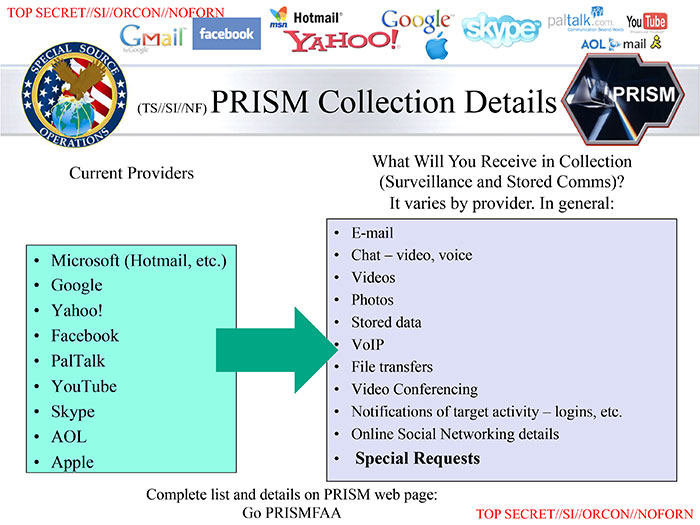Ever since Edward Snowden blew the whistle on dragnet surveillance, national media attention has largely focused on the National Security Agency. It makes sense. The NSA is shadowy, enormous, and incredibly powerful. The technological capabilities at NSA far outshine those at other government agencies. But the FBI has more of an impact on the day to day lives of people throughout the United States, and can lock up people in prison. And while you might not know it from listening to the majority of the post-Snowden media coverage on spying, the FBI, an organization infamous for politically motivated harassment and spying, is just as surveillance hungry as its colleagues in military-intelligence.
When Glenn Greenwald's book dropped yesterday, his publisher also made available never before released NSA files disclosed by Snowden. Among them is this gem, dated August 2012, called "Expanding PRISM Sharing With FBI and CIA":

As you can see, the FBI has nearly unrestricted access to the NSA's PRISM system, which harvests huge quantities of private content from internet communications providers like Google, Facebook, Apple, and Yahoo. As the NSA says, "PRISM is a team sport!"
As a refresher, here are some of the things that PRISM provides to the NSA, CIA, and FBI, in both real-time and retrospectively: email, chat (video and voice), videos, photos, stored data, Skype converstaions (and other voice over IP), file transfers, video conferences, real-time login information, social networking details, and more.

Unfortunately, the Obama administration firmly believes that Americans' international communications like those listed above don't deserve any privacy protections. As my colleague Jameel Jaffer writes,
In two significant but almost-completely overlooked legal briefs filed last week, the US government defended the constitutionality of the Fisa Amendments Act, the controversial 2008 law that codified the Bush administration's warrantless-wiretapping program. That law permits the government to monitor Americans' international communications without first obtaining individualized court orders or establishing any suspicion of wrongdoing.
What on earth makes the Obama administration think that Bush's warrantless wiretapping program is legitimate? Here's the government's argument, as excerpted by Jaffer:
The privacy rights of US persons in international communications are significantly diminished, if not completely eliminated, when those communications have been transmitted to or obtained from non-US persons located outside the United States.
Therefore according to President Obama's administration, journalists in New York who communicate with sources in Germany do not have a right to privacy in their communications. The NSA and FBI can read their emails and listen to their phone conversations and Skype conferences without warrants.
In an interview broadcast last night on Frontline PBS' documentary about the US surveillance state, former NSA and CIA director Michael Hayden said that the FISA Amendments Act (FAA) not only legalized the Bush administration's warrantless wiretapping program, but expanded it. Since Obama's administration urged FAA reauthorization in 2012 and has vigorously defended the law in court, warrantless wiretapping on steroids is now President Barack Obama's shame to bear.
Efforts are currently underway in congress to eat away at some of the government's post-9/11 surveillance powers. Among those efforts is the imperfect but important USA Freedom Act. As Jaffer says, it's a critical first step to reining in the unaccountable, unconstitutional, violative surveillance state that has metastasized over the past thirteen years. But if we want to deny the FBI warrantless access to our international communications, and keep the descendants of J. Edgar Hoover out of our email inboxes, the USA Freedom can't be the end of our efforts.
If PRISM is a team sport, so must be the fight to stop warrantless and dragnet electronic surveillance.
